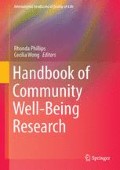Abstract
Sustainability has been predominantly associated with ecological integrity. The concept suggests built-in or internal mechanisms that perpetuate or maintain a system, perhaps indefinitely. Thus we should not be surprised when non-ecological organizations, and their well-being are said to be ‘sustainable.’ This study asks the question: what conditions of community lead to sustainable well-being, especially social well-being? The underlying premise is that attention to the essence of community will lead both to more sustainability and greater social well-being. The answer offered is that for sustainable well-being, communities need caring capital, which is a structure in which mutual caring maintains social well-being within a community. This premise is illustrated with exemplary Ecovillage communities.
Access this chapter
Tax calculation will be finalised at checkout
Purchases are for personal use only
References
Anderson, R. E. (2014). Human suffering and quality of life -conceptualizing stories and statistics. New York: Springer.
Anderson, R. E. (Ed.). (2015). World suffering and the quality of life. New York: Springer.
Glenn, E. N. (2000). Creating a caring society. Contemporary Society, 29(1), 84–94.
Glenn, E. N. (2010). Forced to care – coercion and caregiving in America. Cambridge, MA: Harvard University Press.
Howarth, R.B. (2012). Sustainability, well-being and economic growth. Minding Nature. 5(2). http://www.humansandnature.org/sustainability-well-being-and-economic-growth. Accessed on 26 Sept 2015.
Jobert, K., & Dregger, L. (Eds.). (2015). ECOVILLAGE:1001 ways to heal the planet. Devon: ßTriarchy Press.
Johansson, S., Leonard, R., & Noonan, K. (2012). Caring and the generation of social capital: Two models for a positive relationship. International Journal of Social Welfare, 12(1), 44–52.
Langlois, A., & Anderson, D. E. (2002). Resolving the quality of life/well-being puzzle: Toward a new model. Canadian Journal of Regional Science, XXV(3), 501–512.
Lyubomirsky, S., Sheldon, K. M., & Schkade, D. (2005). Pursuing happiness: The architecture of sustainable change. Review of General Psychology, 9(2), 111–131.
Nussbaum, M. (1996). Compassion: The basic social emotion. Social Philosophy & Policy, 13(1), 27–58.
Nussbaum, M. (2001). Upheavals of thought: The intelligence of emotions. Cambridge: Cambridge University Press.
O’Brien, C. (2013). Happiness and sustainability, together at last! Sustainable happiness. Canadian Journal of Education, 36(4), 228–256.
Oliner, S. P. (2008). Altruism intergroup apology, forgiveness, and reconciliation. St Paul: Paragon House.
Sachs, J. D. (2015). The age of sustainable development. New York: Columbia University Press.
Salvati, A. (2008). Altruism and social capital. Boca Raton: Universal Press.
Van Gelder, S. (Ed.). (2014). Sustainable happiness: Live simply, live well, make a difference. Oakland: Berrett-Koehler Publishers and Yes Magazine.
Wuthnow, R. (1991). Acts of compassion – caring for others and helping ourselves. Princeton: Princeton University Press.
Author information
Authors and Affiliations
Corresponding author
Editor information
Editors and Affiliations
Rights and permissions
Copyright information
© 2017 Springer Science+Business Media Dordrecht
About this chapter
Cite this chapter
Anderson, R.E. (2017). Community Functioning That Fosters Sustainable Social Well-Being. In: Phillips, R., Wong, C. (eds) Handbook of Community Well-Being Research. International Handbooks of Quality-of-Life. Springer, Dordrecht. https://doi.org/10.1007/978-94-024-0878-2_1
Download citation
DOI: https://doi.org/10.1007/978-94-024-0878-2_1
Published:
Publisher Name: Springer, Dordrecht
Print ISBN: 978-94-024-0876-8
Online ISBN: 978-94-024-0878-2
eBook Packages: Social SciencesSocial Sciences (R0)

